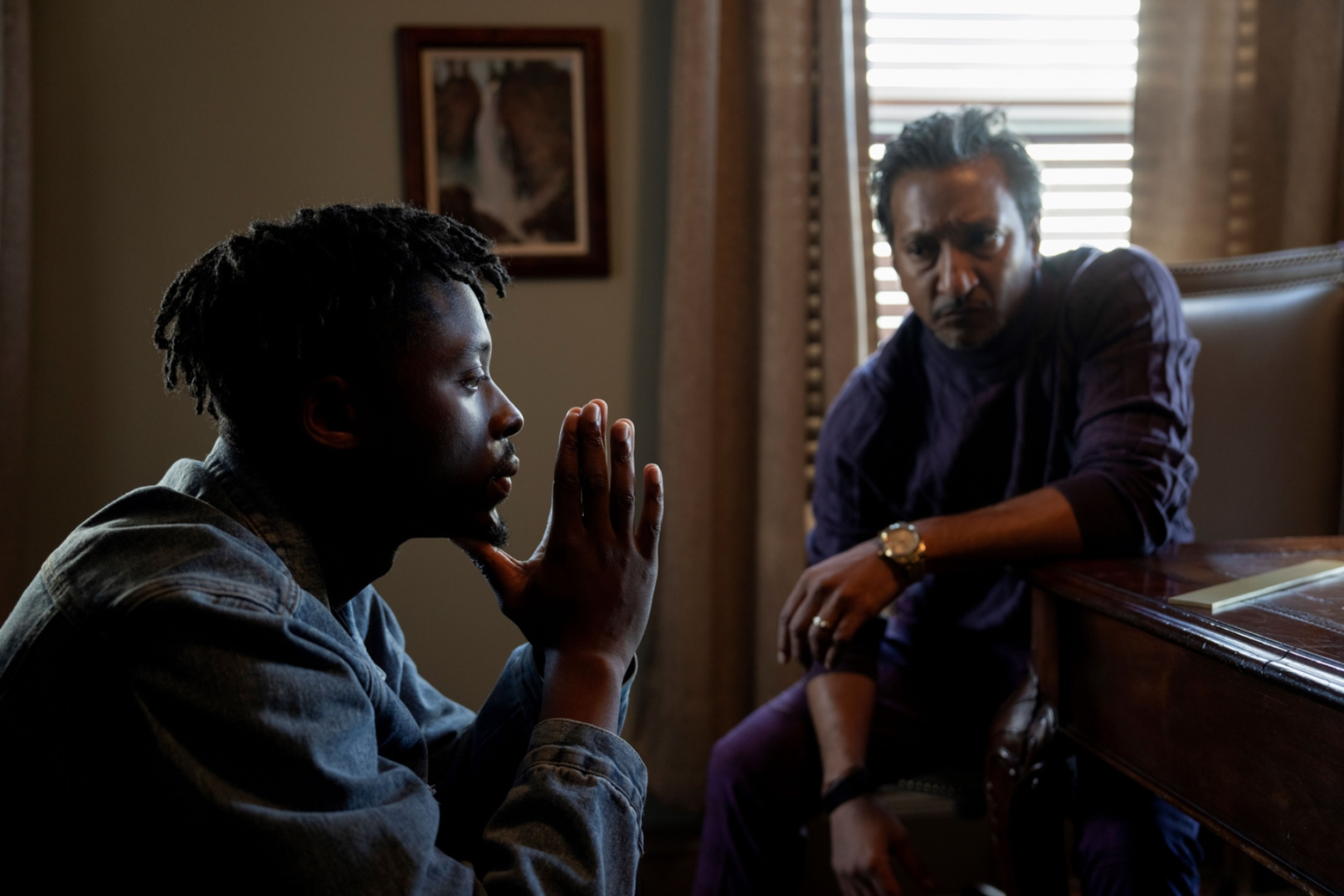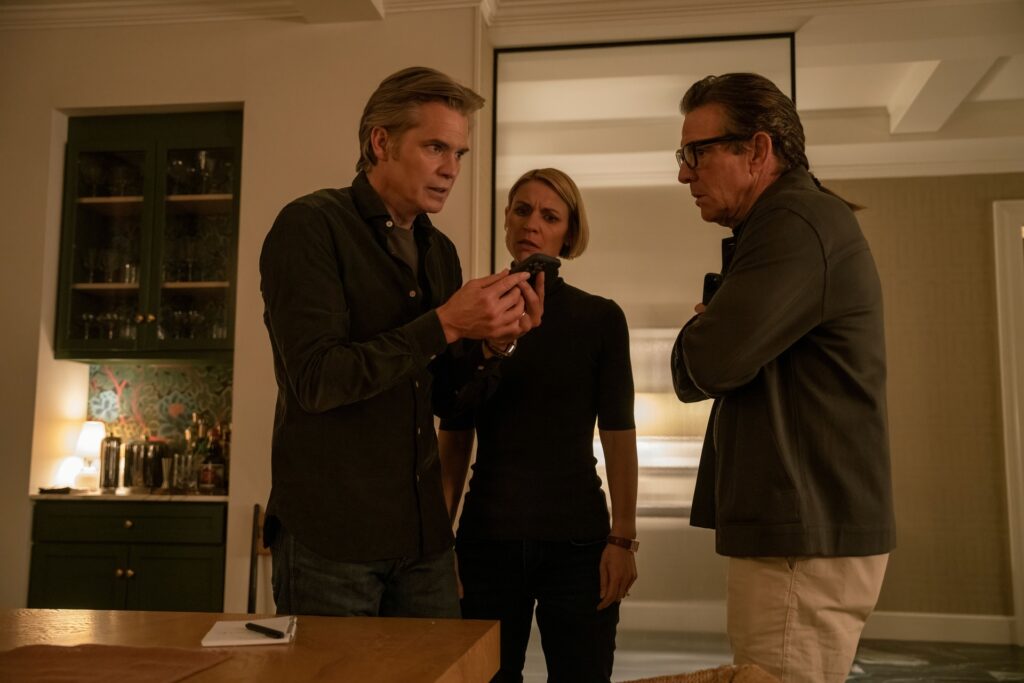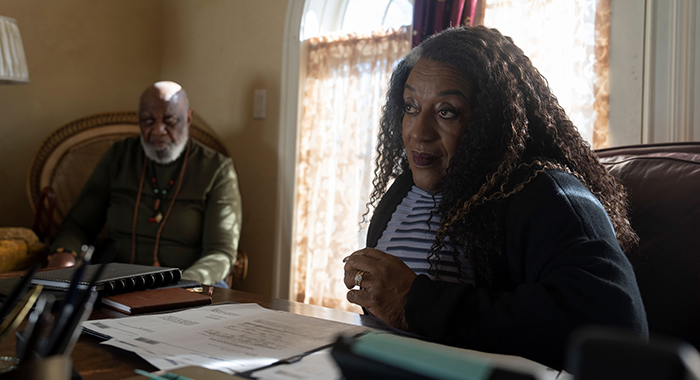
Oscar-winning director Steven Soderbergh is known for creating a mix of stylish (read: Channing Tatum-starring “Magic Mike”) and influential films (like “Traffic”).
It’s no surprise to see his name attached to stars like Claire Danes, Dennis Quaid, Timothy Olyphant, Jim Gaffigan and writer Ed Solomon (of “Men in Black” and “Bill & Ted’s Excellent Adventure” fame). But a story about the Guyanese community in Queens, New York was quite unexpected.
The six-part mini-series centers around the foiled kidnapping of Jared Browne (played by Ethan Stoddard), the son of Samantha and Derek Browne (Danes and Olyphant) and grandson of celebrity “Chef Jeff” McCusker (Quaid).
The scheme is devised by Savitri Mahabir (played by CCH Pounder of “Avatar” and “NCIS: New Orleans”), a wealthy Guyanese businesswoman with a host of nefarious ventures, and her right-hand man, Garmen Harry (Phaldut “Paul” Sharma). Mahabir is seeking revenge for the recent murder of her brother-in-law by rival Edward Chung, but what does this have to do with the Brownes?
The answer to this question and the unraveling of other dark secrets is what “Full Circle” is all about.

Now, if this sounds complicated, that’s because it is. The show is fast-paced and makes good use of cliffhangers to keep you watching, but, frankly, the episodes are shaky — quite literally in terms of camera work and figuratively.
Early on, Soderbergh darts between stylish, abstract shots of objects in the shadows and minute details that may create an air of mystery, but ultimately just confuses viewers, raising questions that never get answered.
Most of the acting also leans toward melodrama, but many of the supporting cast members — particularly Sharma and Zazie Beetz (as Detective Mel Harmony) — are commendable, delivering natural performances with the right doses of intimidation and snark.
On paper, the plot of “Full Circle” has all the pieces for suspense, but writer Ed Solomon seems to lack confidence in the viewer to figure it all out, opting against compelling revelations in favor of long-winded monologues summarizing everything for the viewer. This is needed, unfortunately, as most other dialogues are unproductive; consisting solely of characters responding to questions with more questions.
Another major point of contention is the portrayal of Guyana and the Guyanese community.
While The Hollywood Reporter suggests the team had several creative consultants, those with knowledge of the country could say the series actually offers a convoluted image.
The attention of Guyanese viewers like myself may pique hearing familiar words like pickney (children) and bad eye (evil eye) and catching glimpses of Georgetown. Those in Queens may smirk at the mention of real-life venue, Gemini’s Lounge, but other elements arguably come off as reductive and a bit unflattering.
The Guyanese characters are the antagonists. Mahabir is shown lying, cheating, stealing and plotting murders with a smile on her face. She doesn’t use facts or strategy to guide her actions, but Obeah practices and fear of curses.
The casting of these roles is also up for debate considering several staging choices were made by the creators.
For example, an early scene shows a Hindu funeral with a pandit reciting prayers and a chowtal (North Indian classical music) group sitting by in white kurtas and shalwars. This is a familiar sight for many Indo Caribbeans but, as the camera pans, audiences are introduced to several Afro-identifying actors playing the mourning family including Pounder and Jharrel Jerome (as Mahabir’s nephew, Aked).
Guyana is a diverse nation where cultures and racial identities often intermingle and, of course, there very well can be Afro-Guyanese Hindus with Indian names, but one could argue the series missed a huge opportunity to offer rare Indo Guyanese representation in these roles.

While Pounder (born in Guyana) and Jerome are talents with impressive resumes, it begs the question if they were the right talents for the roles. To some viewers, the answer is no.
“Guyana is trending right now. There’s the oil, the booming tourism, chefs on TV and Instagram,” shared Sonia, a young Indo Guyanese woman from Queens, reflecting on the show with me. “In that way, I’m happy [the country is] on people’s radar, but [it seems like] nobody looked into the characteristics of the people before casting. Some things are just not culturally correct. The Obeah is dubious and the Guyanese accents will leave you scratching your head.”
This reaction is not surprising. Aside from Pounder and Sharma, none of the cast is Guyanese, let alone Caribbean. In fact, Pounder shared in an interview that pages of the script were rewritten several times to play with Guyanese elements.
To be fair, I wouldn’t be surprised if the creators had difficulty finding actors for the characters, especially Indo Caribbean actors. But for those familiar with the country, “Full Circle” could appear to have haphazardly mixed the actors as well as bits and pieces from a variety of Guyanese cultures in an attempt to create a catch-all portrayal, rather than a necessarily accurate one.
Today, there are talks of not one, but two Jim Jones biopics starring Leonardo DiCaprio and Joseph Gordon Levitt, respectively, but Guyana is more than the dark history of Jonestown or shady acts like those orchestrated by Mahabir.
Guyana is a country with a rich history, diverse culture and proud people. As one of the first high-profile Hollywood productions to highlight Guyana, it’s disappointing to see “Full Circle” fall into Jonestownian tropes of using it simply as a poverty-stricken place to be exploited, where people will do anything for money and personal gain.
While it’s exciting to see Guyana and the Queens community in a mainstream series and to hear Hollywood bigwigs utter names like Essequibo, “Full Circle” also exemplifies just how much room for growth there is in Indo Guyanese representation.
Hopefully “Full Circle” is just the first of many productions to explore Guyanese culture and, in the near future, we can escape the negative stereotypes that remain so prevalent. For the time being, the series is one that leaves a lot to be desired on many fronts.
All six episodes of “Full Circle” are now streaming on Max.




